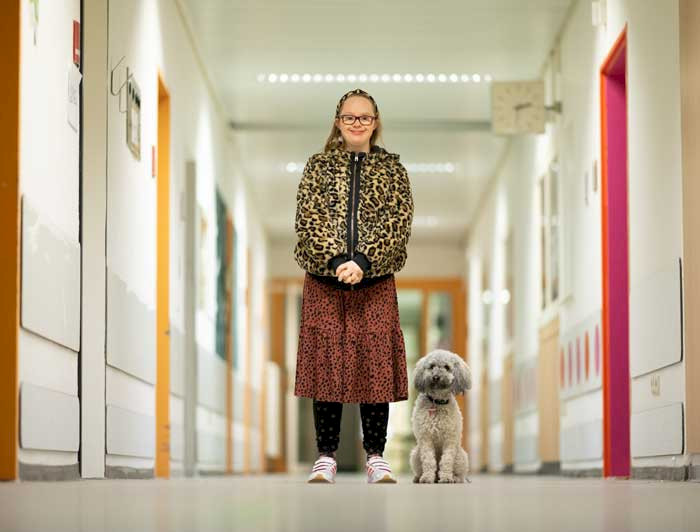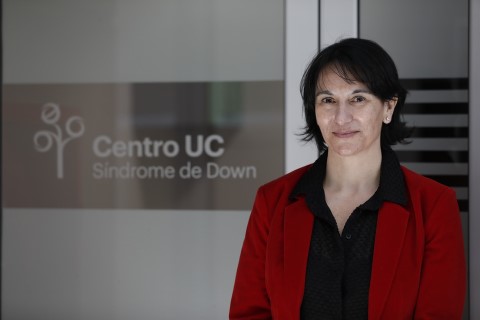UC Chile Collaborates in the Publication of New Resources on Down Syndrome in Spanish and Japanese
The Global Down Syndrome Foundation, the UC Chile Down Syndrome Center, and the Japan Down Syndrome Association have joined forces to translate and provide online access to the GLOBAL health care guides for adults with Down Syndrome.

photo_camera The GLOBAL Adult Guidelines are the first evidence-based guide for adults with Down Syndrome and were published in English in the Journal of the American Medical Association (JAMA) in 2020. Photo: Reuters
The Global Down Syndrome Foundation (GLOBAL) published the Spanish and Japanese versions of the GLOBAL Medical Care Guidelines for Adults with Down Syndrome (GLOBAL Adult Guidelines) in collaboration with the Center of the Pontificia Universidad Católica de Chile (UC Chile Down Syndrome Center) and the Japan Down Syndrome Association (JDSA).
The GLOBAL Adult Guidelines are the first evidence-based guide for adults with Down Syndrome and were published in the Journal of the American Medical Association (JAMA) in 2020.
The authors of the guidelines are directors of the largest Down Syndrome clinics in the United States, and the nine topics covered in the guidelines include:
- Behavior
- Dementia
- Diabetes
- Cardiovascular Disease
- Obesity
- Osteoporosis
- Atlantoaxial Instability (affecting the upper bones of the spine)
- Thyroid Disease
- Celiac Disease
GLOBAL is working to expand the topics to include sleep apnea, solid tumors, leukemia, vision/eye care, physical therapy, and exercise.
In addition to the 80-page guidelines for medical professionals, GLOBAL has also published a family-friendly version, which is much shorter, and toolkits that include easy-to-follow assessments for celiac disease, diabetes, behavior, and annual check-ups.
All of these resources for adults are now available in Spanish and Japanese, free of charge, on the Global Down Syndrome Foundation (GLOBAL) DSConnect website, the UC Chile Down Syndrome Center website, and on the JDSA website.
“GLOBAL is pleased to be able to reach people with Down Syndrome and their families who live in the United States and speak Spanish or Japanese, with the collaboration of the National Institutes of Health/DS-Connect®,” said Michelle Sie Whitten, president and CEO of the Global Down Syndrome Foundation.
“NIH's Eunice Kennedy Shriver National Institute of Child Health and Human Development has been a supporter from the beginning. We would like to extend our heartfelt gratitude to Dr. Macarena Lizama, director of the UC Chile Down Syndrome Center, Dr. Tamai Kunio, president of JDSA, and Dr. Chisen Takeuchi of JDSA for their invaluable contribution in ensuring that these documents are accessible to hundreds of thousands of Spanish and Japanese speakers worldwide.”
Since 2006, GLOBAL has collaborated with Congress to advocate for the NIH’s transversal Down syndrome research funding program and for its increase.
In December 2010, GLOBAL and NIH co-hosted the first Down syndrome research conference, which focused on registries and biobanks. A significant outcome of this conference was the inception of DSConnect.
The Importance of These Guidelines

Yadira Carrillo, a 32-year-old self-advocate and entrepreneur with Down syndrome, emphasized the significance of having the GLOBAL Guidelines available in Spanish, stating, "It's crucial for me and other individuals with Down syndrome to access this resource in Spanish. I need to know how to take care of myself as an adult!"
In Chile, GLOBAL has collaborated closely with Dr. Lizama on several initiatives, such as developing the Spanish version of the GLOBAL Guidelines and the COVID-19 and Down syndrome resource.
According to Dr. Macarena Lizama, medical director of the Universidad Católica Down Syndrome Center in Chile, "The contributions made by Michelle, Bryn Gelaro, and their team in the realm of research and medical care are highly significant."
"We are delighted to partner with GLOBAL on this transformative resource and promote medical equity, particularly in Spanish-speaking countries where people with Down syndrome may have limited access to care and basic resources. We are thrilled to integrate this resource into our clinical practice and share it with colleagues and families.”
This sentiment is shared by Dr. Tamai Kunio:
"We are appreciative of the partnership we have forged with GLOBAL, and having this critical resource available in Japanese is a dream come true. My daughter and thousands of Japanese adults with Down syndrome will undoubtedly benefit from this. We eagerly anticipate collaborating with GLOBAL to expand into new medical fields in the years ahead."
GLOBAL is currently working with the UC Chile Down Syndrome Center and the Chilean Ministry of Health to make the guidelines freely available and easily found on their disability web pages.


